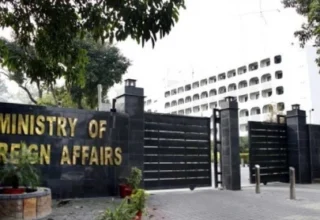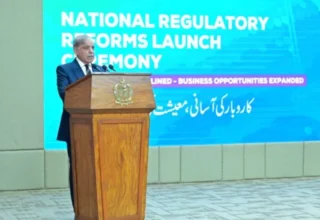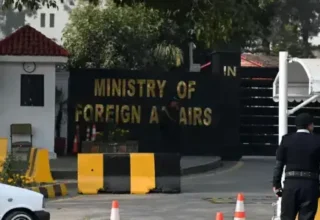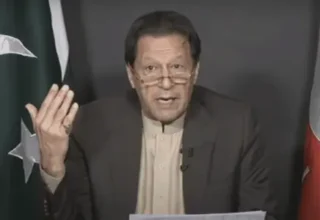
- Indian Opposition makes fun of Modi’s claim
India Wednesday shot down its own satellite with a missile, claiming to have acquired the “most advanced capability among space superpowers”; prompting neighbouring Pakistan to urge avoiding militarization of the space and providing tweetaris an opportunity to make fun of Modi’s ‘false’ claims.
Indian Prime Minister Narendra Modi said in a television broadcast that an anti-satellite missile fired from a testing facility in Odisha, eastern India, downed a live Indian satellite in orbit at about 300 kilometers in “a difficult operation” that lasted some three minutes.
“Our scientists shot down a live satellite 300 kilometers away in space, in low-earth orbit,” Modi was quoted as saying.
He hailed India’s first test of such technology as a major breakthrough that establishes it as a space power. India would only be the fourth country to have used such an anti-satellite weapon after the United States, Russia and China, Modi added.
“India has made an unprecedented achievement today … India registered its name as a space power.”
The Indian Foreign Ministry said in a statement that the latest test was aimed at protecting India’s assets in space against foreign attacks.
“The capability achieved… provides credible deterrence against threats to our growing space-based assets from long-range missiles, and proliferation in the types and numbers of missiles,” the statement read.
The three-minute test in the lower atmosphere ensured there was no debris in space and the remnants would “decay and fall back on to the earth within weeks,” it added.
Anti-satellite weapons allow for attacks on enemy satellites and provide a technology base to intercept ballistic missiles. Such capabilities have raised fears of weaponization of space and setting off a race between rivals.
Indian Opposition makes fun of Modi’s claim
Modi’s claim attracted slurs and criticism from the mainstream opposition parties as the politicians and tweetaris cracked jokes about Modi’s claim.
It is worth mentioning here that exactly a month back on February 27, Indian Air Force jets had also shot down own Mi-17 helicopter during a dogfight against Pakistan Air Force aircraft.
“Well done DRDO, extremely proud of your work. I would also like to wish the PM a very happy World Theatre Day,” tweeted Rahul Gandhi, prompting other opposition leaders, journalists and active tweeteris to ridicule the Indian PM’s claim.
Every nation should avoid militarization of space; Reacts Pakistan
In a statement after the test, Pakistan said space is the “common heritage of mankind and every nation has the responsibility to avoid actions which can lead to the militarization of this arena.”
“We hope that countries which have in the past strongly condemned demonstration of similar capabilities by others will be prepared to work towards developing international instruments to prevent military threats relating to outer space,” the statement by Pakistan’s Foreign Ministry said without mentioning India by name.
“Boasting of such capabilities is reminiscent of Don Quixote’s tilting against windmills,” it said, in a reference to the delusional hero of the 17th-century Spanish novel by Miguel de Cervantes.
Separately, the United States and Russia have not made any comment on the Indian test. But China’s Foreign Ministry said it hoped all countries “can earnestly protect lasting peace and tranquility in space.”
Indian test may trigger a new space militarisation; Experts fear
Uday Bhaskar, director of the Society for Policy Studies, a Delhi think-tank, said a concern for India was that China could help its old ally Pakistan neutralize any advantage.
“I don’t think Pakistan has acquired that level of accomplishment yet by itself, but Pakistan is no longer seen alone,” he said. “Pakistan and China have a very deep strategic kind of partnership. So some kind of sharing of capabilities can’t be ignored.”
India has had a space program for years. It successfully sent a low-cost probe to Mars in 2014 and plans its first manned space mission by 2022.
Brahma Chellaney, a security expert at New Delhi’s Center of Policy Research, said the United States, Russia and China were pursuing anti-satellite (ASAT) weapons.
“Space is being turned into a battlefront, making counterspace capabilities critical. In this light, India’s successful ‘kill’ with an ASAT weapon is significant.”
Pakistan and India have routinely tested ballistic missiles since they first became nuclear capable in 1998 and 1974, respectively.
The 20-mt-long Agni-II ballistic missile can carry a payload of 1,000 kilograms over a distance of 2,000 kilometers. Neither of the neighbors has signed the Non-Proliferation Treaty (NPT) or other international regulatory pacts that restrict developing or testing nuclear weapons.
Pakistan says it has successfully test-fired a new domestically-built “smart weapon,” apparently an air-to-surface missile.








